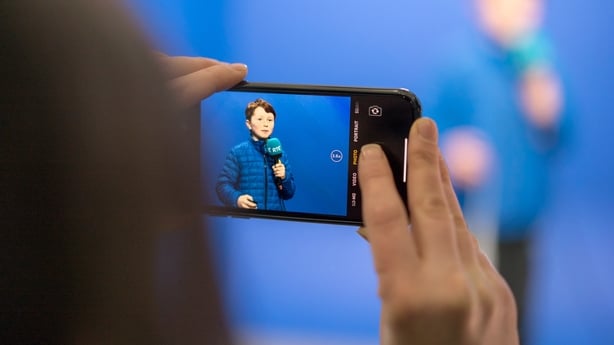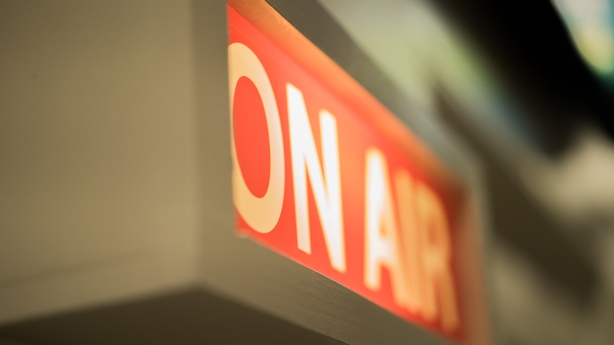Irish people have always told their stories and shared their ideas, passions and pain through various forms of cultural expression. From the achievement of Ireland's world renowned writers and musicians to the anarchic wit of its comedians, the life of the imagination is highly valued in this country.
For over 50 years RTÉ has consistently connected cultural expression, journalism and politics while retaining the trust of the Irish people. Now in 2018, this public purpose has never been more necessary or more relevant.
At its best, public service media provides a compelling response to the challenges of the digital era; to the challenges of a fragmenting society and of polarising public debate; and to the significant public distrust of institutions, authority and information.
In a world dominated by international media conglomerates like Sky and Liberty Global; tech giants like Facebook and Google; and international content providers like Netflix and Amazon, strong Irish public media, accountable to its audience, is more important than ever.

Public media is essential if we are to have broadcast journalism with the resources, authority and trust to ask the tough questions and address the issues, challenges and questions facing our own society.
Strong public media is essential if we want to sustain a vibrant Irish culture, develop and support local programme makers and creative talent, ensure a strong local voice, and help sustain a distinctive national identity.
And public media is essential if we are to continue to have those moments of shared national experience - be it sporting, cultural or political - available free-to-air, where everyone and every community is included, and where all the expressions of ourselves have a home.
"Some of that challenge is positive, and is forcing a healthy two-way conversation between the media and our audiences."
Today RTÉ remains at the centre of Irish public life – our radio, television and digital services are accessed in any given week by over 90% of the people living in Ireland.
However, as strong as RTÉ’s connection with the public is, the role that public media plays in Irish life, and indeed that played by much of traditional media, is being challenged like never before.
Some of that challenge is positive, and is forcing a healthy two-way conversation between the media and our audiences. But other challenges, largely driven by new technology and greater connectivity, are threatening to undermine the media’s capacity to do its core job. This is as true for public media organisations, such as RTÉ, as it is for newspapers and commercial broadcasters.
While, broadly, traditional patterns of media consumption endure (television and radio still remain very strong), consumer behaviour is undoubtedly shifting, particularly among younger people, towards on-demand, online, and mobile services.
As broadband coverage increases, as digital devices become even smarter, and as global competition becomes ever greater, the pace of change will accelerate.
Yesterday I set out for staff in RTÉ how we will meet the challenges of the future and renew RTÉ for the next generation; a generation that has never been without the internet, the smart phone, on-demand video services, social media, and access to the best programming and content from all over the world; a generation for which RTÉ is only one of many sources of news, programming and information that they value and trust.
Of course this is not the profile of the majority of RTÉ’s audience today. But it will be soon.
"It is clear that we will have to better reflect the increasing diversity of modern Ireland."
If RTÉ is to remain relevant, we must meet the needs of new and future generations. We must re-imagine public service media so that it works for everyone, and engages everyone, wherever they are and however they consume. We know we have work to do.
More than anything it is the stories we tell and the programmes we make that define us. Driven by a much deeper understanding of audience needs, RTÉ’s best response to the challenges we face is in maintaining our focus on high-quality Irish programming and content..
And as RTÉ continues to deliver compelling programming across our channels and services, we will grow and experiment even more in the digital space.
At a time when information and misinformation can disseminate to millions in seconds, RTÉ must continue to deliver the best reporting and broadcast journalism, and increasingly on new and emerging platforms. In just the last few weeks we have begun delivering video and audio news bulletins for Amazon’s Alexa, where all RTÉ’s radio services are now accessible through voice activation.
To meet the needs of all citizens, it is clear that we will have to better reflect the increasing diversity of modern Ireland; this means us finding new voices, and helping others find their voice.

By focusing on creativity and innovation, and by supporting programme makers and journalists, RTÉ will draw on its strengths and ensure that audiences in Ireland continue to have access to distinctive home-produced programming. RTÉ will also help sustain and grow a vibrant indigenous production and media sector, so important to Ireland’s overall creative economy and global cultural footprint.
Given Ireland’s size, RTÉ plays a unique role in developing creative talent and nourishing creative ideas. RTÉ must work even harder to be home to the best creative talent in the country. Audiences in Ireland have a right to expect RTÉ to find and support new voices and new perspectives; and for those that have enjoyed success, particularly internationally, we must make RTÉ a place for them to return to and work with.
Irish drama will be a key focus in the years ahead. Over the next five years we want to help build a strong Irish drama sector that will give opportunities to our most talented producers, writers, directors and actors, and allow us to further develop co-production and international distribution relationships.
"RTÉ has always proven to be adaptable and durable in the face of change."
RTÉ is planning to make significant investments in new technology, digital production facilities, and our distribution infrastructure. These are essential to ensure audiences get the best quality services when and where they want. These investments will be funded from the proceeds of RTÉ’s sale of land assets in Donnybrook.
To meet the scope of our ambitions we know we must grow our commercial income across the next five years and, like any business, maintain our focus on efficiencies. It also is clear that RTÉ cannot transform itself or plan for the future without clarity on its public funding.
Reform of the current licence fee collection system must be a priority. The system is now losing over €50 million every year. Before Christmas, the Joint Oireachtas Committee on Communications, in their report on Future Funding of Public Service Broadcasting, recommended a series of reforms to the licence fee system and to broadcasting policy that if implemented could be transformative, not just for RTÉ, but for the whole creative sector in Ireland. It sets a clear direction; it is now for Government to act.
Without a combination of commercial growth, increased efficiencies, and public funding reform, RTÉ will not be able to adapt to meet the needs of the future, to invest in Ireland’s creative economy, or continue to deliver the range of services and programming our remit demands.
RTÉ has always proven to be adaptable and durable in the face of change. In one of the most competitive and porous media markets in the world, RTÉ has always believed in its capacity to deliver a distinctive and valuable service for audiences in Ireland. That commitment to strong impartial journalism, to creativity, to renewal and innovation, is essential now if RTÉ is to remain relevant and valuable to audiences in the future.
I believe that role is worth defending, worth supporting, and worth renewing for the next generation.
Dee Forbes
Director-General, RTÉ
You can read the full strategy document here



